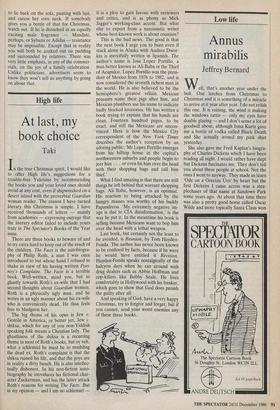High life
At last, my book choice
Taki
In the true Christmas spirit, I would like to offer High life's suggestions for a trouble-free Yuletime by recommending the books you and your loved ones should avoid at any cost, even if shipwrecked on a desert island with the proverbial Guardian woman reader. The reason I have turned literary this Christmas is simple. I have received thousands of letters — mainly from academics — expressing outrage that the literary, editor failed to include yours truly in The Spectator's Books of the Year issue.
There are three books to beware of and to try extra hard to keep out of the reach of the children. The Facts is the autobiogra- phy of Philip Roth, a man I was once introduced to but whose hand I refused to shake in view of his having written Port- noy's Complaint. The Facts is a terrible book. Well-written, mind you, but so ghastly towards Roth's ex-wife that I had second thoughts about Guardian women. Roth is a physically ugly man, and he writes in an ugly manner about his ex-wife who is conveniently dead. He thus feels free to bludgeon her.
The big theme of his opus is Jew v. Gentile in America, or better yet, Jew v. shiksa, which for any of you non-Yiddish speaking folk means a Christian lady. The ghastliness of the shiksa is a recurring theme in most of Roth's books, but oy veh, what a schlemiel he must be to mudsling the dead ex. Roth's complaint is that the shiksa ruined his life, and that the goys are in reality a dirty bunch. He is also intellec- tually dishonest. In his non-fiction auto- biography he introduces his fictional char- acter Zuckerman, and has the latter attack Roth's reasons for writing The Facts. But in my opinion — and I am no schlemiel — it is a ploy to gain favour with reviewers and critics, and is as phony as Mick Jagger's working-class accent. But what else to expect from a narcissistic writer whose best-known work is about onanism?
This is the bad news. The good is that the next book I urge you to burn even if stuck alone in Alaska with Andrea Dwor- kin is mercifully written in Spanish. The author's name is Jose Lopez Portillo, a man better known as Ali Baba or the Thief of Acapulco. Lopez Portillo was the presi- dent of Mexico from 1976 to 1982, and is now considered the seventh richest man in the world. He is also believed to be the hemisphere's greatest villain. Mexican peasants name their pigs after him, and Mexican plumbers use his name to indicate badly blocked lavatories. He has written a book trying to explain that his hands are clean. Fourteen hundred pages, to be exact, and still the Mexicans are uncon- vinced. Here is how the Mexico City correspondent of the New York Times describes the author's reception by an adoring public: `Mr Lopez Portillo emerges from his hilltop home in the capital's northwestern suburbs and people begin to jeer him . . . or even hit him over the head with their shopping bags and call him thief.'
What I find amazing is that there are still things he left behind that warrant shopping bags. Ali Baba, however, is an optimist. His reaction to being attacked by the hungry masses was worthy of his buddy Papandreou. 'My extremely negative im- age is due to CIA disinformation,' is the way he put it. In the meantime his book is selling because Mexicans want to bop him over the head with a lethal weapon.
Last book, but certainly not the least to be avoided, is Reunion, by Tom Hayden- Fonda. The author has never been known to be confined by facts, because if he were he would have entitled it Revision. Hayden-Fonda speaks nostalgically of the halcyon days when he ran around with drug dealers such as Abbie Hoffman and cop-killers like Bobby Seale. He lives comfortably in Hollywood with his banker, which goes to show that God does punish the guilty after all.
And speaking of God, have a very happy Christmas, try to forgive and forget, but if you cannot, send your worst enemies any of these three books.










































































































 Previous page
Previous page